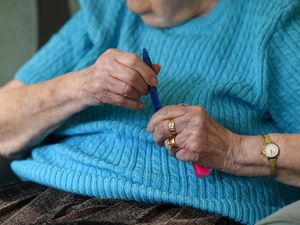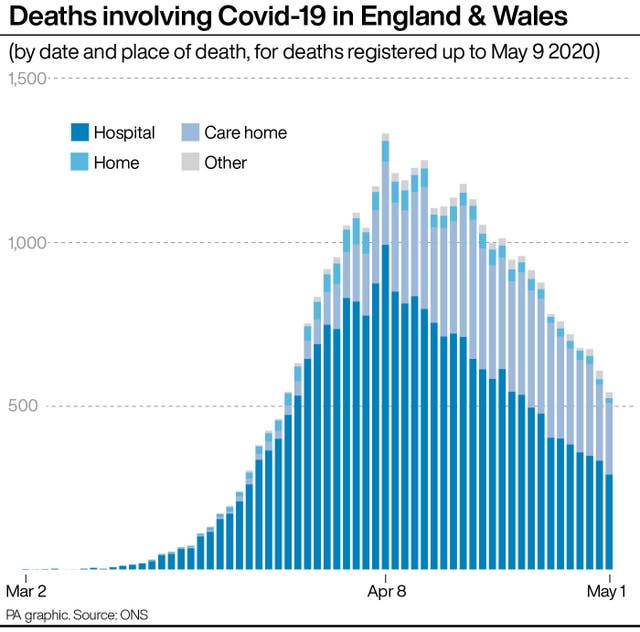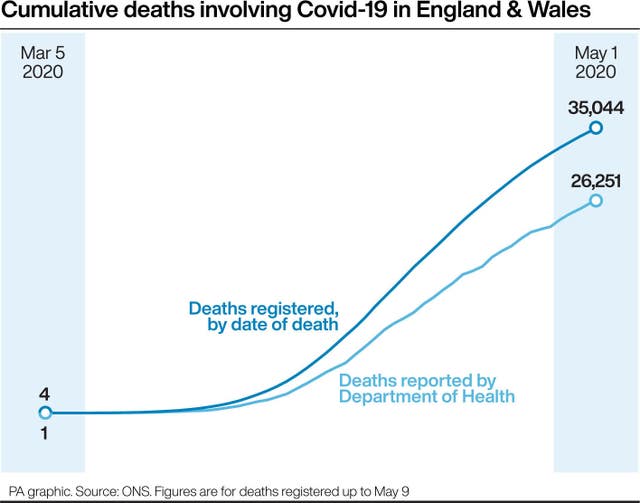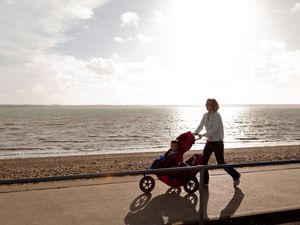Care homes account for 40% of all coronavirus deaths in week to May 1 – ONS
At least 10,535 Covid-19-related deaths to date have taken place outside hospitals.

Care home deaths accounted for some 40% of coronavirus-related fatalities registered in England and Wales in the week ending May 1, with at least 10,535 of all deaths to date taking place outside hospitals, figures show.
Of the 6,035 deaths linked to Covid-19 and registered in the week ending May 1, some 2,423 (40%) were in care homes, compared with 3,214 (53%) in hospitals.
This weekly number of care home deaths is a slight dip from 2,794 in the previous seven days and is the first week-on-week decrease since March 20, according to the Office for National Statistics (ONS).
Of all deaths involving coronavirus up to May 1, some 22,873 took place in hospitals, while 10,535 were elsewhere.
Of these:
– 8,312 took place in care homes
– 1,562 were in private homes
– 386 occurred in hospices
– 142 took place in other communal establishments
– 133 happened elsewhere
The ONS said the numbers are based on where Covid-19 is mentioned anywhere on a death certificate, including in combination with other health conditions.
Analysis by the PA news agency now puts the the number of deaths involving Covid-19 in the UK at over 40,000, which includes the new data published on Tuesday.
These figures show that 35,044 deaths involving Covid-19 occurred in England and Wales up to May 1.
Together with data from Scotland and Northern Ireland, and more recent fatalities published by NHS England on Monday, it indicates that the overall death toll for the UK is just over 40,000.
Data from the ONS shows that between the week ending March 27 – towards the start of the outbreak – and May 1, some 108,345 deaths were registered in England and Wales.

This is 46,494 more deaths than the five-year average, with Covid-19 contributing to 75% of the excess fatalities.
These non-coronavirus related deaths are being investigated by ONS, which says it will publish detailed analysis on this in the future.
When looking at the figures by date of death, they suggest a peak in daily care home deaths may have taken place on April 17, when 415 deaths occurred.
During the following week, daily deaths declined consecutively for all days but one – April 22, when deaths rose by 20.
The corresponding peak for deaths in hospitals is April 8, when 983 occurred.
In the week ending May 1, there were 17,953 deaths registered across England and Wales – a decrease for the second week running.
But Nick Stripe, head of health analysis at the ONS, said this is still around 8,000 deaths above the average for this time of year.
Speaking to BBC News, he said: “That is about 4,000 lower than it was the week before but it is still 8,000 above the average that we would expect to see in this week at this time of year.
“So it is actually the seventh highest weekly total since this data set started in 1993, so we have had four out of the top seven weeks in the last four weeks.”
He said deaths in care homes were over three times above the average number of fatalities expected for this time of year.
“Care homes is showing the slowest decline, sadly,” he told the BBC.

Of all deaths in the week ending May 1, some 6,397 were in hospitals while 6,409 were in care homes.
“For the first time that I can remember, there were more deaths in total in care homes than there were in hospitals in that week,” Mr Stripe said.
“Admittedly only 12 more, but there were more and I’ve never seen that before.”
The UK Alzheimer’s Society expressed concern about the overall death toll in care homes being higher than average for this time of year, as it called for the social care sector to be put “on an equal footing with the NHS”.
Fiona Carragher, director of research and influencing, said: “70% of care home residents have dementia and we’re deeply concerned that this indicates an increase in deaths due to dementia, caused by isolation and reduction in care workers.
“Each of these deaths is a heart-breaking loss to their friends, families and carers which is why the Government must honour their commitment to ensure care homes get testing for all residents and staff and the protective equipment they need.”

Separate analysis shows there were 8,314 deaths in care homes involving coronavirus reported by care home providers in England to the Care Quality Commission between April 10 and May 8, according to the ONS.
Dr Layla McCay, a director at the NHS Confederation, said: “Promises for care homes such as support on infection control are all very well, but we must see real action to make sure they are kept.
“This means not only supplying the proper PPE, training and support in infection control, but importantly, providing adequate funding going forward.”
In response to the figures, minister for care Helen Whately said the Government continues to “work night and day” to support social care providers.
“It is a relief to see the number of deaths in care homes falling, but sadly they continue to make up a significant proportion of coronavirus-related deaths and our work is not done,” she said.
“Supporting the social care sector through this pandemic has always been a priority, and we are doing everything in our power to ensure they have all they need to look after those in their care.”





